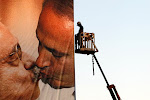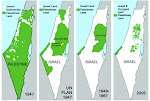IDF Snipers - how they cope with intimate kills
A recent study about snipers in Israel has shown that snipers are much less likely than other soldiers to dehumanise their enemy, the BBC's reports.
Part of the reason for this may be that snipers can see their targets with great clarity and sometimes must observe them for hours or even days.This justification - which was supported by friends, family and wider Israeli society -
"It's killing that is very distant but also very personal," says anthropologist Neta Bar. "I would even say intimate."
She studied attitudes to killing among 30 Israeli snipers who served in the Palestinian territories from 2000 to 2003, to examine whether killing is unnatural or traumatic for human beings.
She chose snipers in particular because, unlike pilots or tank drivers who shoot at big targets like buildings, the sniper picks off individual people.
What she found was that while many Israeli soldiers would refer to Palestinian militants as "terrorists", snipers generally referred to them as human beings.
Snipers almost never referred to the men they killed as targets, or used animal or machine metaphors. Some interviewees even said that their victims were legitimate warriors.
There were about 20 gunmen escorting a convoy and one of them was unlucky enough to get in the sight of my scope. The distance was about 300m, almost nothing for a sniper.
A few seconds later I saw him lying motionless.
In the heat of the moment my only thought was to shoot more and more. I saw the figures rushing in panic and trying to hide.
We killed all of them, except three or four who were wounded and captured. Afterwards I blamed myself for not being cool-headed enough. I thought that if I had been calmer, I would have killed more enemies.
"The Hebrew word for human being is Son of Adam and this was the word they used by far more than any other when they talked about the people that they killed," she says.
"Here is someone whose friends love him and I am sure he is a good person because he does this out of ideology," said one sniper who watched through his scope as a family mourned the man he had just shot. "But we from our side have prevented the killing of innocents, so we are not sorry about it."
could be one reason why the snipers didn't report any trauma after killing, she suggests.
"Being prepared for all those things that might crack their conviction, actually enabled them to kill without suffering too much."
She also noted that the snipers she studied were rational and intelligent young men.
In most military forces, snipers are subject to rigorous testing and training and are chosen for aptitude. In the UK, they complete a three-month training course, with a pass rate of only one-in-four.






















